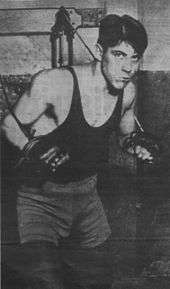Justo Suárez
| Justo Suárez | |
|---|---|
 | |
| Statistics | |
| Real name | Justo Antonio Suárez |
| Nickname(s) | "El Torito de Mataderos" |
| Weight(s) | Light weight |
| Nationality |
|
| Born |
January 5, 1909 Buenos Aires |
| Died |
August 10, 1938 (aged 29) Cosquín, Córdoba |
| Boxing record | |
| Wins | 24 |
| Losses | 2 |
| Draws | 1 |
| No contests | 1 |
Justo Suárez (b. Buenos Aires, Argentina, January 5, 1909 - † Cosquín, Córdoba, Argentina, August 10, 1938), nicknamed "El Torito de Mataderos" ("The Little Bull of Mataderos)", was a popular Argentine light weight boxer. His huge popularity was widely greater than his professional achievements as a fighter. Suárez was the first sportsman that became an idol, having gained huge popularity in Argentina during the decade of the 1930s.
Biography
Suárez was the 15th (of 25 in total) son of a family and grew up in the misery. He had to work being still a child to help his family. From the age of 9 Suárez worked in different jobs, one of them in a slaughterhouse (very common in the Mataderos neighborhood). At the same time he started to practise boxing in his house located in Guaminí street in Mataderos.
At 19, Suárez was already a professional boxer which allowed him to gain his first money fighting in festivals celebrated in any part of Buenos Aires. During one of those meetings, Suárez was nicknamed as the "Torito of Mataderos", which would remain until now in popular memory. He did not have a skilled technique but his fierce and attitude made him win many fights and therefore, more people attended to see him to box.

When José Lectoure, a famous fight organizer, met Suárez, he said to him "You fight in the "criollo" style, so you have to learn the technique of boxing", and began to teach him adopting as his ward.
Two years later Suárez was fighting for the Argentine championship and a huge crowd followed him. He fight against Julio Mocoroa in the old River Plate stadium, winning the combat by points average. By then, Suárez' social level had increased notably. For the first time, the relegated low class saw how one of them could escape from the poverty to live a comfortable life in the highest level.
Due to his popularity in Argentina, Suárez shipped to United States to make some fights in that country. He fought 5 times in only 4 months, winning all of them and gaining a reputation in the USA. He returned to Argentina with the honours of the best. He fought against the Chilean Estanislao Loayza at a sold-out Luna Park stadium, winning by points average in what is considered one of his best fights. Amongst the attendance was the President of Argentina, José Félix Uriburu and the Princes of England, Edward of Windsor and George de Kent, father of Queen Isabel II, who acclaimed Suárez from the lead seats when the referee raise his hand proclaiming him as the winner.
Suárez returned to New York City to fight for the World Championship, having to combat against different rivals in the road to the title. His first rival was a tough boxer, Billy Petrolle, who had not a renown sportsman but defeated Suárez in 9 rounds. This was the first Suárez' lost in his professional career. With this defeat, Suárez lost the chance to fight for the world championship.[1]
A time before, Suárez had been caught with tuberculosis and the illness became strongest within him. In 1932 lost his second match at the hands of Víctor Peralta, which resulted in the break up of the deal with his mentor Lectoure. Being devastated by the sickness, Suárez went to Córdoba with the few money he had. Three years laters he would pass away in the misery, far away from the glory of past times.
His body was brought from Cosquín to Buenos Aires, and buried in La Chacarita Cemetery, being accompanied by a multitude who took the coffin and entered it to the Luna Park, the place where Suárez had written his most glorious pages.[2]
In popular culture

- On July 16, 1930, the popular Tango singer Charlo recorded Muñeco al Sueño, a song dedicated to Suárez.
- One of the most Julio Cortázar's famous tales, Torito (from the book Final del Juego, 1956) was dedicated to Suárez, whom Cortázar admired.[3]
- Argentine reggae band Los Pericos tributed Suárez with the song Torito, from the album Pampas Reggae (1994)
- In 2001, a movie called I love you... Torito was released in Argentina.
- The street where the Nueva Chicago stadium is located on, was named "Justo Suárez" as a tribute to the boxer. So there is a bust of Suárez on the corner of Alberdi and Murguiondo streets, in the Mataderos neighborhood.
See also
References
External links
- Torito, short story by Julio Cortázar. (in Spanish)
- Torito song lyrics by Los Pericos, dedicated to Justo Suárez (in Spanish)